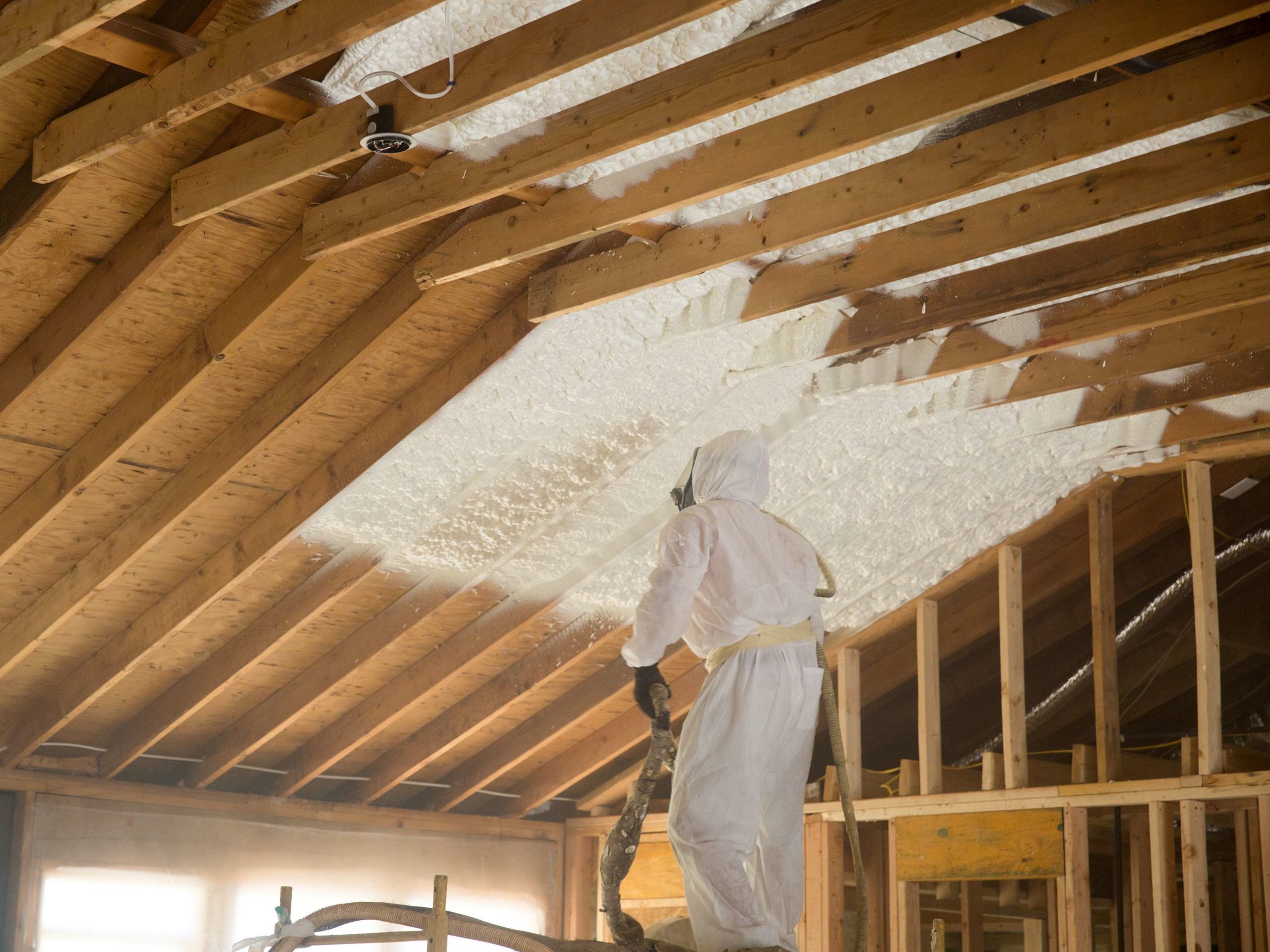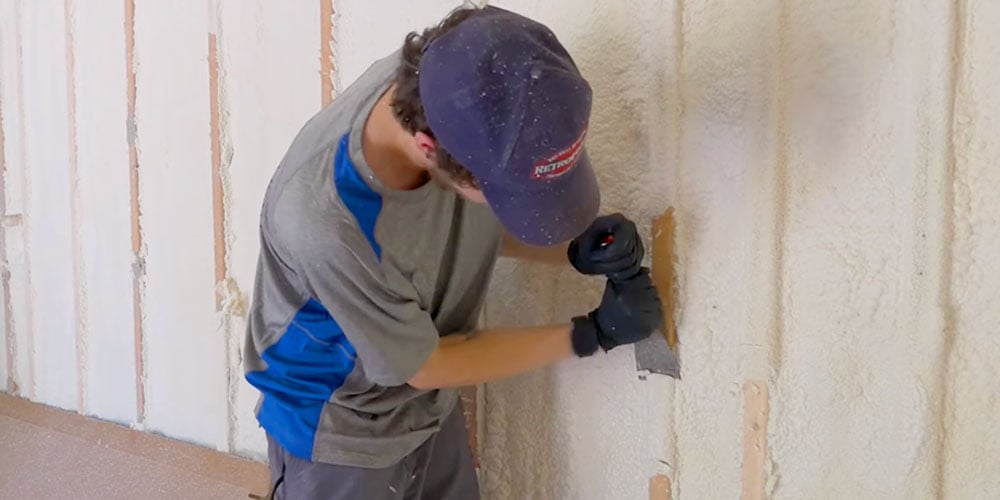The Environmental Impact of Spray Foam: Sustainability Factors To Consider
The Environmental Impact of Spray Foam: Sustainability Factors To Consider
Blog Article
Spray Foam: The Ultimate Service for Air Sealing and Insulation
Spray foam insulation has actually emerged as a leading option for reliable air securing and thermal insulation, providing a special combination of buildings that set it apart from standard approaches. Recognizing the complete scope of its advantages, setup processes, and contrasts with various other insulation kinds is crucial for making notified choices.
What Is Spray Foam?
Spray foam is a versatile insulation product that incorporates the principles of air securing and thermal resistance to boost power efficiency in structures. Composed largely of polyurethane or other comparable substances, spray foam is used as a liquid that expands upon contact with surfaces, producing a solid, continuous layer of insulation. This unique residential property permits it to load spaces, cracks, and spaces that traditional insulation materials might neglect, providing a superior air seal.
There are 2 major kinds of spray foam: open-cell and closed-cell. Open-cell spray foam is lighter and more adaptable, offering outstanding noise absorption and a lower R-value per inch - Spray Foam. On the other hand, closed-cell spray foam is denser, offering a greater R-value, moisture resistance, and added architectural honesty to developing parts
The application process normally entails specific tools, making sure a seamless application that sticks to various substratums, including timber, concrete, and metal. This versatility makes spray foam ideal for both brand-new constructions and retrofitting existing structures. Its capability to develop an airtight barrier dramatically adds to minimizing energy intake and improving interior air top quality, therefore making it a favored choice amongst house owners and contractors alike.
Benefits of Spray Foam Insulation
One of one of the most substantial advantages of spray foam insulation is its remarkable ability to produce a continuous air barrier, which properly lessens power loss. Unlike typical insulation materials, spray foam expands to load gaps and splits, making certain that air leakage is substantially minimized. This characteristic not only enhances power performance however likewise brings about decrease utility costs in time.
Furthermore, spray foam insulation offers premium thermal resistance, contributing to a more secure interior environment. Its high R-value per inch permits reliable insulation in constrained rooms, making it excellent for attics, walls, and crawl rooms. Additionally, the moisture-resistant homes of spray foam aid prevent mold and mildew growth, advertising healthier living problems.
One more important benefit of spray foam insulation is its sound-dampening qualities (Spray Foam). It successfully lowers noise transmission between spaces, creating a quieter and a lot more comfortable home setting. The sturdiness of spray foam likewise stands out, as it does not sag or work out with time, maintaining its efficiency throughout its life-span
How Spray Foam Functions
Recognizing just how spray foam insulation functions is essential for appreciating its efficiency in air securing and thermal resistance. Spray foam insulation contains 2 key components: isocyanate and polyol resin. When these parts are blended, they undertake a chemical response that triggers the material to click this link increase rapidly, creating a thick foam that fills gaps, tooth cavities, and splits.
As the foam broadens, it abides by surface areas, forming an airtight seal that considerably lowers air infiltration. This characteristic makes spray foam insulation very reliable at avoiding drafts and moisture penetration, which can result in energy loss and damage in time. Furthermore, the closed-cell version of spray foam offers superior thermal resistance as a result of its inflexible structure, successfully minimizing warmth transfer.
The unique residential or commercial properties of spray foam allow it to satisfy uneven surface areas, guaranteeing comprehensive protection and a seamless barrier. Consequently, spray foam insulation not only boosts energy performance yet additionally adds to enhanced interior air quality by reducing the accumulation of toxins and irritants. Eventually, understanding the auto mechanics behind spray foam highlights its function as a superior choice for insulation and air securing in both property and commercial applications.
Setup Refine Review

Before installation, the area must be effectively cleaned and prepped, making certain that surface areas are devoid of wetness, dust, and debris. This step is essential due to the fact that impurities can jeopardize bond and overall performance. When the location is prepared, the application entails mixing the two elements of the spray foam, which expands upon get in touch with and fills up spaces efficiently.
Educated specialists ought to conduct the installation, making use of specific equipment to ensure consistent coverage and optimum density. Safety precautions, including putting on protective gear and making sure correct ventilation, are imperative during this procedure. After application, the foam generally treatments promptly, forming a solid obstacle that improves energy performance.
Contrasting Spray Foam to Traditional Insulation
When examining insulation options, spray foam insulation stands out in contrast to traditional materials such as fiberglass and cellulose. Unlike fiberglass and cellulose, which can permit air infiltration, spray foam broadens upon application, loading voids and gaps to create an impermeable seal.
In addition, spray foam offers a greater R-value per inch than standard insulation types, offering even more reliable thermal resistance in a thinner profile. why not try these out This particular is particularly helpful in rooms with restricted cavity depth. Spray foam is resistant to wetness and mold development, which can be a considerable concern with cellulose and fiberglass, specifically in humid atmospheres.
Nevertheless, spray foam insulation commonly brings a greater ahead of time expense than its standard equivalents. House owners should evaluate this first financial investment versus long-lasting power savings and performance advantages. Inevitably, while both insulation types serve their purpose, spray foam emerges as an extra innovative remedy for modern insulation requirements, especially in regards to air sealing and thermal efficiency.

Verdict
In summary, spray foam insulation stands for a very effective option for accomplishing ideal air sealing and thermal resistance. Its distinct buildings, consisting of moisture resistance and noise dampening, make it appropriate for numerous applications in both new building and constructions and retrofitting tasks (Spray Foam). The preliminary costs might be higher compared to traditional insulation products, the long-term advantages, such as considerable energy cost savings and improved interior air top quality, justify the financial investment and highlight its worth in contemporary structure techniques.
Spray foam insulation has actually arised as a leading service for effective air securing and thermal insulation, providing an one-of-a-kind mix of residential properties that set it apart from conventional techniques.Spray foam is a flexible insulation product that integrates the concepts of air sealing and thermal resistance to improve power performance in structures.When reviewing insulation options, spray foam insulation stands out in contrast to conventional products such as fiberglass and cellulose. Inevitably, while both check this site out insulation types serve their purpose, spray foam arises as a much more advanced solution for modern insulation demands, especially in terms of air sealing and thermal effectiveness.
In recap, spray foam insulation represents a highly effective remedy for achieving optimal air sealing and thermal resistance.
Report this page